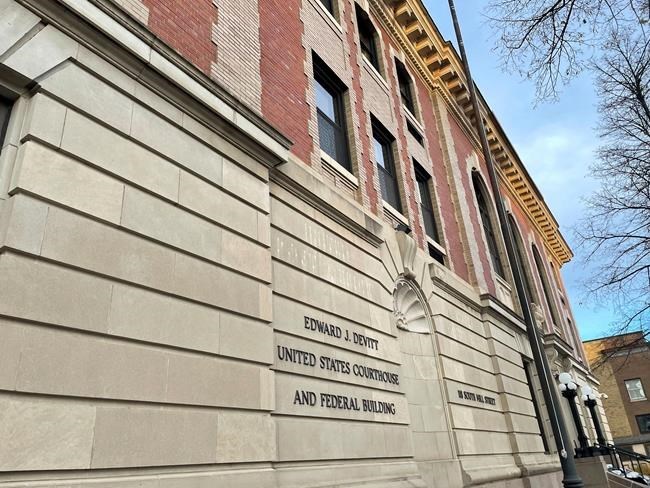
The Edward J. Devitt U.S. Courthouse and Federal building is seen, where two men on trial face human smuggling charges, Monday, Nov. 18, 2024, in Fergus Falls, Minn. (AP Photo/Michael Goldberg)
Republished November 19, 2024 - 11:48 AM
Original Publication Date November 18, 2024 - 9:21 PM
FERGUS FALLS, Minn. (AP) — An Indian migrant who survived a deadly trek across the Canada-U.S. border in blizzard conditions is expected to testify Tuesday in the federal trial of two men accused of taking part in a sprawling human smuggling scheme that ultimately killed a family of four.
Prosecutors allege Indian national Harshkumar Ramanlal Patel, 29, and Steve Shand, 50, put financial profit over human life when they attempted to smuggle Indian migrants across the border into Minnesota over a five-week period. They say Patel ran part of the smuggling scheme and recruited Shand as a driver. Both men have pleaded not guilty to four federal counts related to human smuggling.
Prosecutors say the family of four — 39-year-old Jagdish Patel; his wife, Vaishaliben, who was in her mid-30s; their 11-year-old daughter, Vihangi; and 3-year-old son, Dharmik — froze to death Jan. 19, 2022, after spending hours wandering in heavy snow and bone-chilling cold. Shand had been waiting in a truck for 11 migrants, including the family from Gujarat state, as the wind chill reached minus 36 degrees Fahrenheit (minus 38 degrees Celsius).
The witness expected to testify Tuesday, Yash Patel, is one of two people who managed to reach Shand on the other side of the border. He was arrested along with Shand after a border patrol officer pulled them over before they could escape, prosecutors said.
Patel is a common Indian surname and the victims were not related to Harshkumar Patel.
Prosecutors began building their case Tuesday by calling witnesses who spoke of the brutal conditions under which the Patel family trudged through vast, snow-filled fields and high winds.
Daryl Ritchison, a climatologist and director of the North Dakota Agricultural Weather Network, said temperatures were abnormally cold that January morning and that frostbite can occur within 10 minutes in those conditions.
Troy Larson, a mechanic, said he helped dig a van belonging to a man matching Shand’s description out of a ditch on the side of a desolate stretch of road that morning. Inside the van allegedly driven by Shand, Larson said he observed a person wrapped in a blanket and a child. The van then drove off.
Around the same time, Christopher Oliver, a U.S. border patrol agent had been headed in the van's direction. In the weeks prior, he had seen footprints in the snow and suspected people had been trying to cross the border. He spotted the van and pulled it over. He identified Shand as the driver and arrested him.
Shand and Harshkumar Patel knew the winter weather conditions were extreme but chose to go forward with a plan to smuggle migrants across the border on foot anyway, prosecutor Ryan Lipes said Monday in his opening statement.
"The migrants were dropped at a dark, isolated part of the Canadian border nowhere near a legal port of entry,” Lipes said.
When Jagdish Patel's body was found, he was holding Dharmik, who was wrapped in a blanket, prosecutors added.
“This case is about these two men putting profit over people’s lives, profit they earned by smuggling migrants from India across the Canadian border into the U.S.,” Lipes told the jury.
Thomas Leinenweber, Harshkumar Patel's attorney, said in his opening statement that no one would testify Patel ever talked about a smuggling conspiracy or provided visual evidence of his involvement.
"One of the worst feelings universally that anyone could feel is when you are wrongfully accused,” Leinenweber said.
Shand's attorney, Lisa Lopez, asked the jury to differentiate between the two defendants. She said Shand was an unwitting participant in the smuggling ring.
“Mr. Shand was used by Mr. Patel. And being used does not equate under the law to being guilty of conspiracy,” Lopez said.
Lopez said Shand and the migrants were duped by Patel and the smuggling network. On Tuesday, Leinenweber argued Shand’s defense is antagonistic and prejudicial against his client.
Federal prosecutors say Harshkumar Patel and Shand were part of an international criminal network that scouted for clients in India, got them Canadian student visas, arranged transportation and smuggled them into the U.S., mostly through Washington state or Minnesota.
Prosecutors say Shand told investigators that Patel paid him about $25,000 for the five trips.
The U.S. Border Patrol arrested more than 14,000 Indians on the Canadian border in the year ending Sept. 30. By 2022, the Pew Research Center estimates more than 725,000 Indians were living illegally in the U.S., behind only Mexicans and El Salvadorans.
Prosecutors filed court documents showing Harshkumar Patel was in the U.S. illegally after being refused a visa at least five times and that he recruited Shand at a casino near their homes in Deltona, Florida, just north of Orlando.
Over five weeks, court documents show, Patel and Shand often communicated about the bitter cold as they smuggled five groups of Indians over a quiet stretch of the border. One night in December 2021, Shand messaged Patel that it was “cold as hell” while waiting to pick up one group, the documents say.
“They going to be alive when they get here?” he allegedly wrote.
During the last trip in January, prosecutors say Shand had messaged Patel, saying: “Make sure everyone is dressed for the blizzard conditions, please."
News from © The Associated Press, 2024